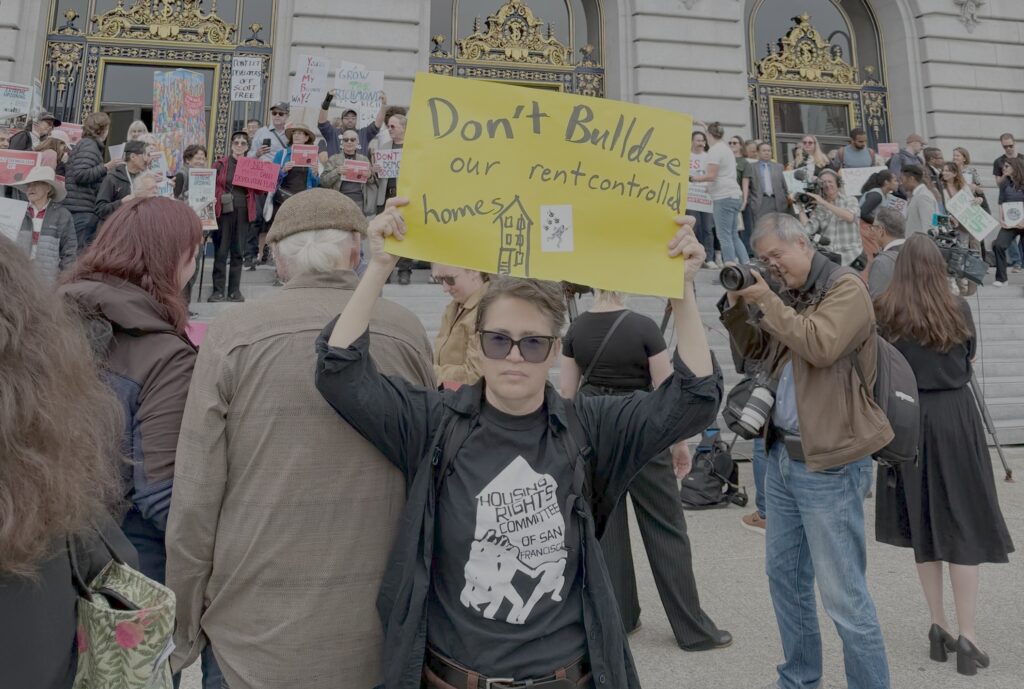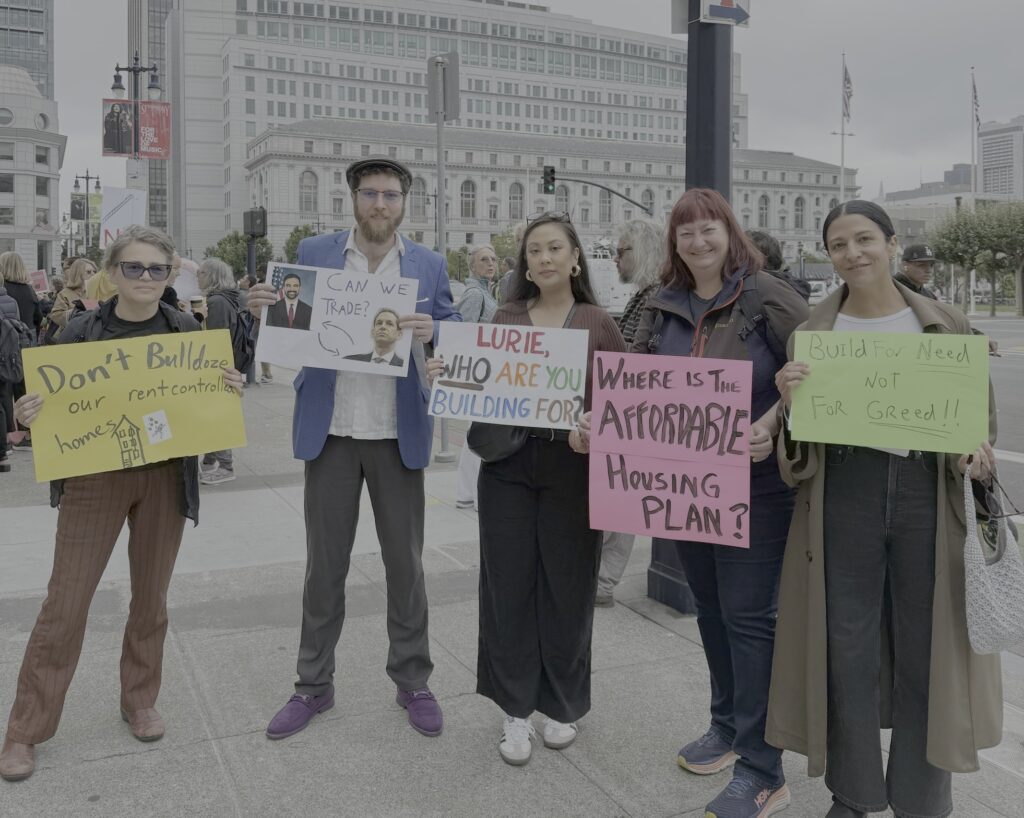The Planning Commission sent to the Board of Supes Thursday night a measure that will change the city forever, against broad community opposition.
The vote wasn’t a surprise—the mayor controls four of the seven votes on the panel, and all of them were in favor of the plan. The three board-appointed commissioners voted No. But the breadth of the opposition will make this a contentious issue at the board.
Supporters and opponents of the plan held rallies in front of City Hall before the meeting, and it quickly got heated.
Lurie was on hand, along with Sups. Danny Sauter, Bilal Mahmood, Matt Dorsey, and Joel Engardio, who support the Lurie plan.
A wide range of community groups were also around to oppose it.
Lurie had a bit of difficulty starting his speech. Members of several coalitions opposing the plan shouted as he approached the stand. Boos and bursts of “liar” came from the crowd.

After several minutes of pushback, Lurie began to speak, with constant interruptions.
He was able to finish his speech, but the tension didn’t disappear. As district supes spoke about their endorsement of the zoning plans, the opposing side continued to push back. There was a clear voice of the fears that the mayor’s plan would lead to widespread displacement in San Francisco.
At the hearing, it appeared more people spoke in opposition to the plan than in favor, raising a wide range of issues. Sup. Connie Chan asked a key question that the mayor has been unable to answer: Who is going to pay for all the infrastructure a massive increase in density will require? She also said that it was critical the final plan include strong labor standards for new construction.
Quintin Mecke, director of the Council of Community Housing Organizations, made the central political point: “This city has been having such a bizarre conversation, focusing on zoning and not production.” He said that tens of thousands of units have already been approved, but aren’t getting built, and yet “we continue to image that zoning will solve all these problems. … We are handing the reins of the most important issue in San Francisco to private developers.” He also noted that the plan allows the transfer of public land to private interests, undermining affordable housing.
Eileen Hirst, a Russian Hill resident, pointed out that everyone, including planning staff, know this will not succeed. The plan will not create much housing at all, much less affordable housing, in the near future, because developers have no interest in building unless they see huge increases in rents (which means the new units won’t be remotely affordable).
Kim Tavaglione, executive director of the Labor Council, said her organization opposed the plan because it doesn’t protect rent-controlled buildings. “Public land should not be developed for market-rate housing,
she said.

She also said that the real-estate industry, which would be in the driver’s seat under the Lurie plan, can’t be trusted. Tavaglione once helped manage a rental building, “and they told me to keep the units vacant until we could get a certain rent.” Qualified people who needed housing were rejected because of the owners’ greed.
Although Lurie says his plan includes relocation programs for small businesses, a representative of Small Business Forward read a statement from Sean Kim, who runs Joe’s Ice Cream, a legacy business that is facing an uncertain future after a developer from Texas bought the property. “Small business eviction is not a fear, it’s a reality,” Kim said. “We cannot compete with the profits on condos.” He said talk of relocation benefits mean nothing: “Once we are displaced, we are gone forever.”
The unions representing police and firefighters have signed on to Lurie’s plan. In an oped in the Chron today, they argued that increased density would make it possible for first responders to move back to the city. Most of the speakers supporting the plan made the same assumption: That building more market-rate housing will eventually bring down prices to the level that families can afford to live in San Francisco.
This, of course, is and should be the essence of the debate: Is there any evidence that, given the immense wealth in this city and the high wages that the tech booms have created, more market rate housing will ever create affordability?
The evidence is pretty clear that it won’t.
If we accept that premise, the rest of the discussion is just about how much money developers should be able to make displacing existing residents and small businesses, and what lengths the city should go to try to mitigate that damage.
The larger issue: Why is the state Legislature, the governor, and the mayor trusting the private sector (which created the crisis we are in) to solve it?
Commissioner Gilbert Williams made a profound point: The foreclosure scams, the role of private equity in buying housing, and the growing economic inequality in the nation have created the current crisis. “This is simply mass deregulation, is doesn’t provide for the 57 percent of our housing that must be affordable. … It doesn’t include any of the equity provisions in our housing element.”
He noted that “this will render this Planning Commission powerless by turning almost all residential development to the director of city planning.”
Commissioner Kathrin Moore said there were “many questions that are unanswered.” She said the plan includes no “clear deliverables” for affordable housing.
Several speakers mentioned state Sen. Scott Wiener. The measure will go before the Board of Supes, and the supervisors from the West Side, the Northeast, and the Haight are going to be under immense pressure. Many of their constituents don’t want the upzoning; the mayor and the big campaign donors do.
But at some point, Wiener, whose bills are forcing the city to allow more market-rate housing, will have to be held accountable. He wants to run for Congress, and will need West Side support. Once residents realize that the bulldozers arriving in the Richmond and the Sunset are there thanks to Wiener, he might be facing a serious problem.



